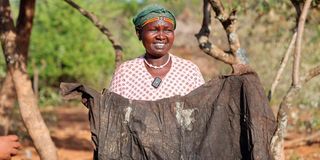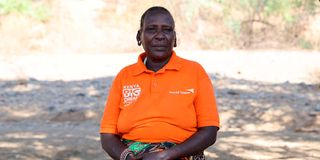700 girls! Shocking confessions of notorious practitioners who abandoned FGM for a higher calling

Holding the ceremonial dress from her days as a circumciser, reformed practitioner Chepkogh Longelech reflects on her journey of transformation in Kamurio Sub-Location, Baringo County on January 21, 2025.
What you need to know:
- Reformed circumcisers Chepotoka Nakapel and Chepkogh Longelech, who collectively performed FGM on more than 700 girls in Baringo County, have traded their blades for new roles.
- Their transformation, sparked by personal tragedies and a community change program, has seen Nakapel become a birth attendant while Longelech runs a honey and beadwork business.
- Both women now champion girls' education over harmful traditional practices.
The weight of a hundred lives rests heavily on Chepotoka Nakapel's weathered hands. At 64, these hands once wielded tools that altered the futures of young girls in the name of tradition. Today, they reach out in protection rather than persecution.
"I now focus on rescuing girls and teaching the community members against the dangers of such harmful practices," says Chepotoka, her voice carrying the weight of transformation as she sits beneath the shade of trees along the Riong'o River.
On this sun-drenched Monday afternoon, Chepotoka has gathered with other reformed practitioners in Tiaty West Constituency. The seasonal river flows northward through Turkana, its waters a witness to both the painful history and hopeful future of the communities it serves.
Her journey into female genital mutilation (FGM) began with desperation rather than choice.
"When Turkana and Pokot fought, and all my livestock were stolen, I moved to Silale," she recalls, her eyes distant with memory. "I started circumcising girls as a way to fend for my then five children."
The practice came naturally to her, having grown up in a community where FGM was deeply woven into the fabric of daily life. She had witnessed countless ceremonies from a young age, watching her mother and grandmother perform the ritual before her.
Cost of custom
"In my community, a girl being circumcised is a good thing," she explains. "If you do not undergo the cut, you will not be married."
The economics of tradition meant survival for Chepotoka and her children. "For one girl, I would be compensated with one goat and Sh5,000 for three girls," she says, calculating the cost of custom. "In a month, I would have about Sh10,000 from about three homesteads."
The rhythm of Chepotoka's work followed the seasons, peaking with the arrival of the rains when the earth softened for tilling. These were prosperous times, when milk flowed freely and food was abundant – perfect conditions, she explains, for the girls to heal.
The ritual itself was deeply embedded in the community's social fabric. "You could always identify a girl ready for circumcision," she recalls, her voice softening. "She would have started her monthly cycle, and custom forbade her from entering the kitchen." By then, she explains, years of cultural conditioning had already convinced most girls to embrace the practice.
Parents would either bring their daughters to Chepotoka's home or fetch her to perform the ceremony. The stakes were high – a circumcised girl would fetch her family a bride price of 25 cows and up to 40 goats once she healed and was deemed ready for marriage.
But fate had other plans for her. The turning point came through tragedy when her son accidentally caused the death of a neighbour's child. Once again, she found herself stripped of her livestock – this time as compensation for the grieving family.
"In my frustration, I started thinking – what if I circumcise a girl and she passes away? What would I use to compensate the family?" Chepotoka's voice trembles slightly as she recalls this moment of reckoning. The question haunted her, forcing her to confront the weight of responsibility she carried with each ceremony.

Chepotoka Nakapel, who traded her circumcision blade for a birth attendant's bag, at her home in Naudo Location, Baringo County on January 20, 2025. She now helps deliver babies.
As she grappled with these thoughts, searching for an alternative way to support her family of eight – including four daughters – an opportunity presented itself. In October 2019, World Vision began offering community change teachings. For her, it was a watershed moment, a chance to redirect her life's path.
The whispers of change first reached her through conversations at the local shopping centre. The promise of an alternative path beckoned, though doubt lingered. "At first I was quite uncertain about stopping FGM," she admits. "I wondered how I would make a living. But the teachings empowered me to understand what I could do to earn an honest living."
Today, she walks with purpose, a black bag of medical supplies always at her side. She has found her calling as a birth attendant, helping bring new life into the world rather than altering young lives through tradition. The community that once knew her as a circumciser now respects her as a healer.
Stories like Chepotoka's gain special resonance today, as the world marks the International Day of Zero Tolerance for Female Genital Mutilation. Across Kenya and beyond, reformed practitioners are stepping forward as powerful voices against a practice that the United Nations has declared a human rights violation. Here in Baringo County, these women's transformations represent more than personal change – they embody the global movement to end FGM within a generation. Their stories of choosing education over tradition, healing over harm, offer hope that cultural practices can evolve while communities thrive.
Fifty kilometres from Riong'o, another story of transformation unfolds. Under the dappled shade of a spreading tree, Chepkogh Longelech, 51, shares her journey away from FGM – a path that led to her youngest daughter's education rather than initiation.
Chepkogh's introduction to the practice began in childhood, woven into the fabric of family tradition through her grandmother and later reinforced by her mother-in-law. The ceremonies first captivated her through their festive atmosphere, a whirl of songs and dancing that masked their darker purpose.
"I was about 10 when I attended my first ceremony," she recalls, her voice softening at the memory. "It was enthralling because in my eyes it was a beautiful event, but I would cover my eyes out of fear when the girls were being circumcised." She pauses, reflecting on her younger self. "By the time I was 15, I had become bolder and confident enough to watch the whole experience."
The lessons of tradition echo across generations. Chepkogh mimics her grandmother's stern instructions from her own initiation: "Do not shake. Spread your arms, open your legs and lie still." Her voice carries the weight of memory. "It was painful, though I sat through it."
Marriage followed, and with it came an apprenticeship under her mother-in-law's guidance.
"I would pass over the tools as she circumcised the girls," Chepkogh recalls, her hands moving unconsciously as she speaks. "I watched how she did it until I had three children of my own. Then I began."
Her tools were simple but devastating – a curved, sharpened piece of iron sheet. The compensation started modestly at Sh100 per ceremony, eventually rising to between Sh500 and Sh5,000. Over the years, the tally of lives altered under her hands would reach 601 girls.
But change, when it came, grew like a seedling through cracked earth. "It all started when World Vision began sensitisation on community change in October 2019," Chepkogh explains, her face brightening. "This initiative was special because we identified our own issues and decided what course of action we would take to address them."
Youngest daughter
A journey to Chemolingot, 38 kilometres away, opened her eyes to different possibilities. There, she witnessed communities thriving without the weight of harmful traditions. The experience sparked a transformation that would alter not just her life, but her daughter's future.
Today, her hands craft beauty instead of inflicting pain. In her shop at the local centre, she sells honey at Sh600 per litre and intricate beadwork – hand pieces ranging from Sh150 to Sh300, neck pieces at Sh500. Her pride is evident as she speaks of the table banking group that helps fund her youngest daughter's education.
"She's in Form Four now," Chepkogh beams, speaking of the daughter she chose not to circumcise. Her smile carries the wisdom of a woman who has found a better path – not just for herself, but for the next generation.
Today, she channels her energy into protecting the very girls she once helped initiate. Her voice carries fresh conviction when she speaks to communities still practicing FGM: "Let us educate our girls instead of letting them go through FGM then marry them off."
The ripples of change are spreading. Alfred Otungo, World Vision's Cluster Manager in Baringo County, reports that their intervention has led to about 42 women abandoning the practice. Their approach focuses on engaging key community decision-makers who can influence others towards mind-set change.
"It is a gradual process," Alfred explains. "First, we dialogue with them and they share what happens during those ceremonies and how the experience was like for them. Then we take them through the dangers of such a practice."
The transformation unfolds in community change classes, where about 60 members gather for six months of consecutive sessions. Here, they don't just discuss problems – they craft home-grown solutions, drawing on the wisdom and experience of their own community members.
Yet challenges persist. Otungo's face grows serious as he discusses the shortage of rescue centres. "We do not have many rescue centres which can be a safe haven for girls who run away," he acknowledges. The situation becomes more complex when poverty intersects with tradition.
In some families, desperation still casts girls as sources of wealth rather than bearers of potential. The math is brutal but simple – a circumcised girl brings livestock through bride price, offering immediate relief to vulnerable families caught between tradition and survival.





